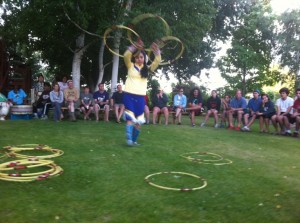
I heard a fascinating interview on the BBC with Gary Hamel, one of the leading management opinion leaders today. He said that most young people inventing new businesses today didn’t go to business school, or if they did, they are throwing out what they learned there. What is the disconnect between giving students today in college—whether business majors or not—the skills they need to fuel our economy forward?   Is the school of business similar to what Bill Gates says about the school of education: it hasn’t changed in fifty years?  In “Academically Adrift: Limited Learning on College Campuses,” researchers found forty-five percent of students made no significant improvement in their critical thinking, reasoning or writing skills during the first two years of college. Students in the liberal arts showed much higher gains when compared to business students.
I see four major areas all students need to add value in someone else’s business or to start their own business:
1)      Imagination. Students, and eventually employees, have to be curious. They have to see existing problems and ask themselves how those problems could be better solved.  They have to bring ideas to the table to improve the team and the company as a whole. They have to be able to see beyond what has always been done to outcomes that are better than pre-existing habits which a company is used to daily, weekly, annually.  People need this curiosity both personally and professionally. This is a big reason why we appreciate the creative arts—they show us how to develop our own powers to imagine.
2)      Innovation.  Innovation, creativity and imagination are inextricably connected.  To innovate, you have to be able to come up with a new concept, a way of solving a customer problem or developing a whole new mode of communication. You have to be able to think unconventionally in ways that can help others to be creative and innovative as well.  There is a fearlessness about looking at things in a different way and the more we go out of our way to experience people in new and different situations, the more we will benefit from different perspectives which can stoke our own creativity.
3)      Risk-taking.  The best employees, and often the best companies, know how to take risks with their ideas.   Those very ideas may morph and develop into something very different than first conception, but the key is to take the thought risk and put new and different ideas forth.  If students are able to take more risks personally, they will be able to take more risks professionally.  We also need employees and managers who aren’t afraid to take risks that don’t pay off because none of us is right all the time. But we can’t afford to not think about the right risks that are worth taking.
4)      Practical intelligence.  Dr. Robert Sternberg who has reengineered the way we do college admissions in this country says that to do well in the world, students and graduates need to be “successfully intelligent,†which has three main components: analytical, creative and practical skills.   School fosters analytical thinking which you are likely strong in if you do well in school.  But, just as important as analytical thinking are the creative skills I listed above as well as practical intelligence which is how to actually get something accomplished—how to run a meeting, how to complete a project, how to choreograph a dance, how to run a project from beginning to end, how to set up meaningful measurements—which is arguably one of the highest ranking job skills in graduates who succeed in the world of work.
Certainly, communication, teamwork, work ethic, honesty, attitude and many other skills go into how well graduates will do in this economy. But if we can look more closely at what colleges actually have students doing these days and how they promote the real learning outside of class like internships and part-time jobs, we’ll likely be closer to the skills Gary Hamel says we need to produce the next generation of employees, managers and CEOs who can do what he sets forth in his best-selling book, COMPETING FOR THE FUTURE.
What other skills do you think graduates need to succeed in the world of work? What else do you think colleges need to do to pave the way? What do high schools need to do to get more students to be college and career ready?
References:
Study: Many college students not learning to think critically, mcclatchydc.com
The Trouble with Capitalism  http://www.bbc.co.uk/iplayer/episode/p00h7mp2/Global_Business_The_Trouble_with_Capitalism/
Share this Article with Your Friends:

















